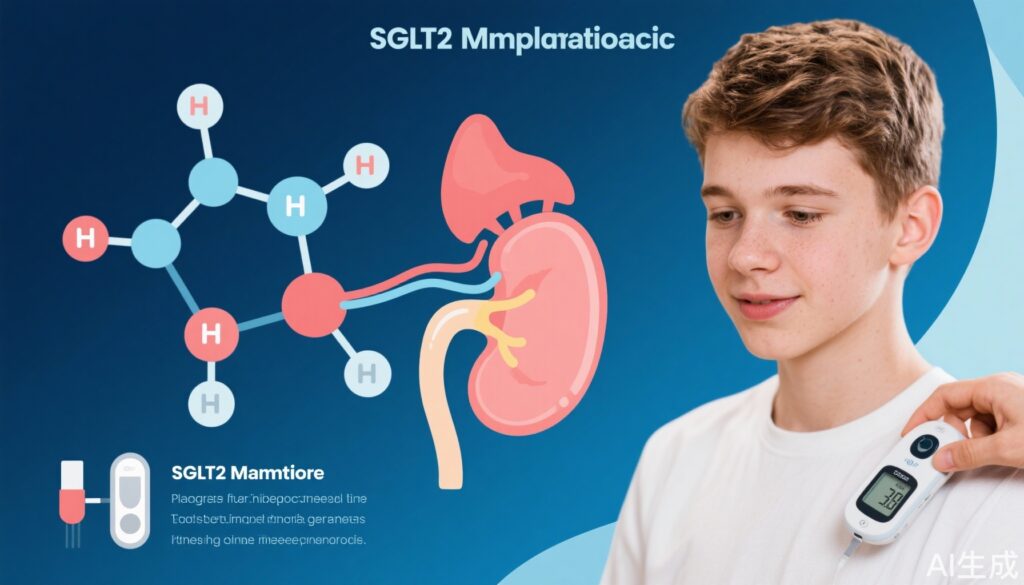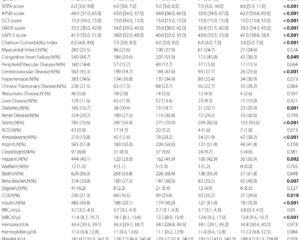Highlights
- The ATTEMPT trial demonstrated that dapagliflozin adjunct to insulin reduced measured glomerular filtration rate (mGFR) in youth with type 1 diabetes, indicating reduction in renal hyperfiltration.
- Dapagliflozin improved glycemic control, evidenced by decreased HbA1c and increased glucose time in range without increasing total daily insulin doses.
- Body weight reduction was observed with dapagliflozin without significant adverse events; only one mild diabetic ketoacidosis (DKA) event occurred under ketone monitoring and education protocols.
- Earlier trials with sotagliflozin and dapagliflozin in adults support renal and glycemic benefits of SGLT2 inhibitors, highlighting translational potential in youth with type 1 diabetes.
Background
Type 1 diabetes (T1D) in youth remains a challenging chronic condition with risk of long-term microvascular complications including diabetic kidney disease (DKD). Despite optimized insulin therapy, many patients experience suboptimal glycemic control and diabetic kidney hyperfiltration, an early sign of renal injury. Sodium-glucose co-transporter 2 inhibitors (SGLT2i) have revolutionized the management of type 2 diabetes (T2D) by improving glycemic control and markedly slowing the progression of chronic kidney disease (CKD). However, their role in T1D—especially in youth—has been less clear due to concerns about diabetic ketoacidosis (DKA) risk. Emerging evidence has sought to clarify the safety and efficacy of adjunct SGLT2i therapy in this population.
Key Content
Chronological Development of Evidence
Initial phase 3 trials of dapagliflozin in adults with inadequately controlled T1D (e.g., DEPICT-2, 2018) demonstrated modest HbA1c reductions (~0.37%-0.42%) and weight loss with good tolerability but increased rates of DKA requiring caution (Laugesen et al., Diabetes Care 2018). Subsequently, pooled analyses of sotagliflozin, a dual SGLT1/2 inhibitor, also in adults with T1D, confirmed reductions in blood pressure, albuminuria, and renal hemodynamic improvements (Kerr et al., Diabetes Care 2019).
Evidence from the ATTEMPT Trial in Youth
The recent ATTEMPT trial (Mahmud et al., Nat Med 2025) represents the first rigorous assessment of dapagliflozin in youth (ages 12–21) with T1D. This 22-week, randomized, double-blind, placebo-controlled study enrolled 98 participants who received dapagliflozin 5 mg or placebo in addition to standard insulin therapy, augmented by systematic ketone monitoring and DKA risk mitigation education.
The primary endpoint, change in measured glomerular filtration rate (mGFR) via iohexol clearance, demonstrated a significant reduction of 8.8 ml/min/1.73 m2 in the dapagliflozin group versus placebo (95% CI: -12.7 to -4.8; P < 0.0001), indicating attenuation of diabetic hyperfiltration—a key early renal injury marker. Participants with higher baseline mGFR exhibited greater reductions, suggesting personalized renal benefits.
Secondary outcomes included a mean HbA1c decrease of 0.47% (95% CI: -0.66 to -0.28) and a 9.0% increase in time in range (glucose 70-180 mg/dL). Body weight dropped by an average of 2.8 kg without changes in total daily insulin doses. Adverse events were balanced between arms; one mild DKA case occurred among dapagliflozin-treated patients but was managed safely under the protocol.
Mechanistic Insights and Translational Implications
SGLT2 inhibition reduces renal glucose and sodium reabsorption, leading to natriuresis, modest blood pressure lowering, and reduced hyperfiltration by restoring tubuloglomerular feedback. This mechanism likely underpins the observed mGFR reduction, potentially slowing DKD progression. Weight loss and improved glycemic parameters contribute to overall metabolic benefits.
Although SGLT2i use in T1D must balance DKA risk, vigilant ketone monitoring and patient education implemented in ATTEMPT provide a model for safe use in youth. These data support expanding adjunct SGLT2i therapy under structured risk mitigation to improve long-term outcomes in T1D.
Expert Commentary
The ATTEMPT data mark a significant advance in T1D management in younger populations, establishing robust renal and glycemic benefits with dapagliflozin adjunct. Nevertheless, the modest sample size and short follow-up highlight limitations, requiring larger and longer trials to confirm durability and safety.
Clinical guidelines currently endorse cautious use of SGLT2i adjuncts in selected adult T1D patients, but pediatric indications remain investigational. The trial’s comprehensive ketone surveillance and standardized education demonstrate best practices to mitigate DKA risk effectively.
Future research should explore stratification by baseline renal risk, optimize dosing, and evaluate cardiovascular endpoints. Real-world implementation will necessitate integrating multidisciplinary care pathways and patient-centered education.
Conclusion
SGLT2 inhibitor therapy adjunct to insulin improves glycemic control, reduces renal hyperfiltration, and supports weight reduction in youth with type 1 diabetes. When combined with rigorous ketone monitoring and DKA risk mitigation, safety is acceptable, opening pathways to new therapeutic strategies addressing early diabetic kidney disease and metabolic control in this vulnerable population. These advances herald a paradigm shift informed by mechanistic understanding and rigorous clinical investigation.
References
- Mahmud FH et al. Adjunct-to-insulin therapy using SGLT2 inhibitors in youth with type 1 diabetes: a randomized controlled trial. Nat Med. 2025;31(7):2317-2324. doi:10.1038/s41591-025-03723-6. PMID:40481206.
- Kerr D et al. The Impact of Sotagliflozin on Renal Function, Albuminuria, Blood Pressure, and Hematocrit in Adults With Type 1 Diabetes. Diabetes Care. 2019;42(10):1921-1929. doi:10.2337/dc19-0937. PMID:31371432.
- Laugesen E et al. Efficacy and Safety of Dapagliflozin in Patients With Inadequately Controlled Type 1 Diabetes (the DEPICT-2 Study): 24-Week Results From a Randomized Controlled Trial. Diabetes Care. 2018;41(9):1938-1946. doi:10.2337/dc18-0623. PMID:30026335.


